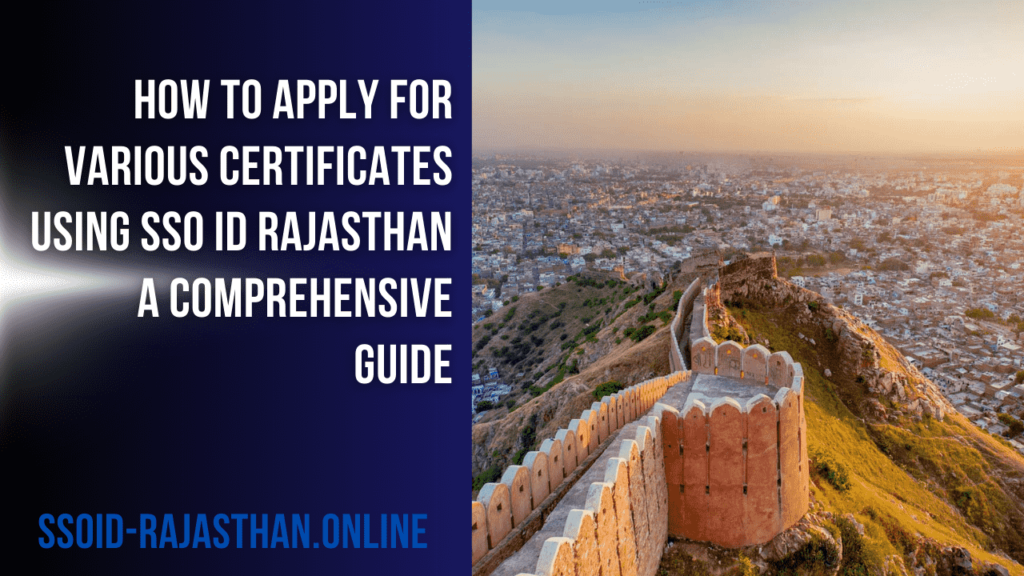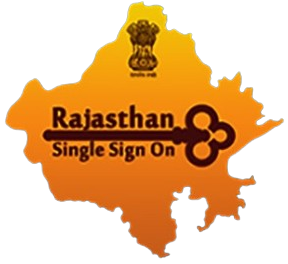In the digital age, governments worldwide are striving to simplify administrative processes and enhance citizen services. Rajasthan, a state in northwestern India, has made significant strides in this direction with the implementation of its Single Sign-On (SSO) ID system. This innovative platform has revolutionized the way citizens interact with government services, particularly in the realm of certificate applications. In this article, we will explore the intricacies of applying for various certificates using SSO ID Rajasthan, analyzing the key factors, challenges, and impacts of this digital transformation.

Essence of Apply for Various Certificates Using SSO ID Rajasthan
Before exploring the certificate application process, it’s essential to understand the fundamentals of SSO ID Rajasthan. The Single Sign-On (SSO) system is a unified digital identity platform that allows users to access multiple government services with a single set of credentials. This centralized system simplifies user authentication and enhances security by minimizing the number of login credentials citizens need to manage.
SSO ID Rajasthan was implemented with the primary aim of creating a seamless interface between citizens and various government departments. By providing a centralized authentication mechanism, it has significantly reduced bureaucratic obstacles and improved the efficiency of service delivery.
Applying for Certificates: A Digital Transformation
One of the most notable applications of the SSO ID system in Rajasthan is its role in certificate applications. Citizens can now apply online for a variety of certificates, including birth certificates, death certificates, domicile certificates, income certificates, and caste certificates. This digital approach has transformed what was once a cumbersome and often frustrating process into a streamlined and efficient experience.
Key Factors Impacting Certificate Applications via SSO ID
Several critical factors influence the process of applying for certificates using SSO ID Rajasthan:
Digital Infrastructure:
The reliability of the digital infrastructure, including servers, networks, and software systems, is crucial for smooth certificate applications.
User Interface Design:
An intuitive and user-friendly application interface significantly impacts the user experience and the successful completion of applications.
Document Verification Process:
The efficiency and accuracy of the backend document verification process are vital for the timely issuance of certificates.
Digital Literacy Levels:
The effectiveness of the online application system is closely tied to the digital literacy levels of Rajasthan’s population, particularly in rural areas.
Data Security and Privacy:
Given the sensitive nature of the information involved in certificate applications, robust security measures are essential.
Integration with Other Government Databases:
Seamless integration with various government databases ensures efficient cross-verification of applicant information.
Balancing Act: Trade-offs and Challenges
While the SSO ID system has greatly simplified the certificate application process, it also presents several challenges and requires careful balancing of various factors:
Accessibility vs. Security:
Balancing easy access to the system with stringent security measures is challenging. Overly complex security protocols might deter users with limited digital literacy, while too much simplification could compromise security.
Speed vs. Accuracy:
There is a need to balance the speed of certificate issuance with the accuracy of information verification. Quick processing is desirable, but not at the cost of accuracy and authenticity.
Standardization vs. Flexibility:
While standardizing the application process ensures consistency, it is also important to maintain flexibility to cater to the unique requirements of different certificate types.
Online vs. Offline Services:
While promoting digital adoption, it is crucial to retain some offline services to accommodate citizens not yet comfortable with digital transactions.
Automation vs. Human Verification:
While automation can speed up the process, certain applications may require human judgment, especially in complex cases.
Challenges in Implementation
The implementation of certificate applications through SSO ID Rajasthan faces several challenges:
Digital Divide:
The urban-rural divide in terms of internet connectivity and digital literacy poses a significant challenge to uniform adoption of the online application system.
Technical Glitches:
Technical issues such as server downtime or software bugs can disrupt the application process, causing frustration among users.
Data Accuracy:
Ensuring the accuracy of pre-filled data and submitted information is critical but challenging, particularly with large volumes of applications.
Resistance to Change:
Both government officials accustomed to traditional methods and citizens unfamiliar with digital processes may resist adopting the new system.
Cybersecurity Threats:
Protecting the system from hacking attempts, identity theft, and other cyber threats is an ongoing challenge.
Impact on Stakeholders
The implementation of certificate applications through SSO ID Rajasthan has significant implications for various stakeholders:
Citizens:
The system offers increased convenience, reduced time and effort, and greater transparency. However, it requires citizens to adapt to new technologies and stay vigilant about digital security.
Government Departments:
The digital system streamlines processes, reducing paperwork and improving efficiency. It also provides valuable data insights for policy decisions but requires substantial changes in operational procedures and ongoing staff training.
Local Authorities:
Municipal corporations and panchayats responsible for issuing various certificates need to align their processes with the digital system.
IT Service Providers:
Companies involved in developing and maintaining the SSO ID system face new business opportunities and challenges, such as continually upgrading solutions to meet evolving needs and security standards.
Intermediaries:
Traditional intermediaries who assisted citizens in obtaining certificates may need to redefine their roles within the new digital ecosystem.
The Way Forward
As Rajasthan continues to refine and expand its certificate application process through SSO ID, several key considerations will shape its future development:
Continuous Improvement:
Regular assessments and user feedback should drive ongoing enhancements to the system’s functionality and user experience.
Enhanced Data Integration:
Further integration with various government databases can streamline the verification process and reduce the need for manual document submissions.
Mobile-First Approach:
Given the widespread use of smartphones, developing a robust mobile application for certificate applications can further enhance accessibility.
Artificial Intelligence Integration:
AI-powered chatbots and automated verification systems can improve efficiency and user experience.
Blockchain Technology:
Exploring blockchain for certificate issuance and verification can enhance security and reduce the risk of fraudulent certificates.
Digital Literacy Initiatives:
Expanding digital literacy programs, especially in rural areas, is essential for increasing adoption and ensuring inclusivity.
Conclusion
The implementation of certificate applications through SSO ID Rajasthan represents a significant step towards digital governance and improved citizen services. While it offers tremendous potential to streamline administrative processes and enhance transparency, it also presents complex challenges requiring careful management.
Balancing digital innovation with inclusivity, security with accessibility, and standardization with flexibility is crucial for creating efficient e-governance. As this digital system evolves, it has the potential to transform the relationship between citizens and government, fostering greater efficiency, transparency, and trust.
The success of this initiative depends on technological advancements and the collective effort of all stakeholders, including government officials, technology providers, and citizens. As Rajasthan leads this digital revolution, it sets a precedent for leveraging technology to create more responsive, efficient, and citizen-centric governance in India. The journey of digitizing certificate applications through SSO ID Rajasthan is an ongoing process of learning, adaptation, and improvement, promising to make the process of obtaining vital certificates simpler, faster, and more transparent.
What is SSO ID Rajasthan?
SSO ID (Single Sign-On Identification) is a unique digital identity provided by the Rajasthan government to its residents. It allows access to various government services and applications through a single online platform.
How do I create an SSO ID in Rajasthan?
To create an SSO ID, follow these steps:
Visit the official SSO Rajasthan portal at https://sso.rajasthan.gov.in.
Click on “Register” and choose an appropriate option (Citizen, Udyog, or Government Employee).
Fill in the required details, such as your Aadhaar number, Bhamashah ID, Facebook account, or Gmail account.
Create a username and password to complete the registration.
What types of certificates can I apply for using SSO ID in Rajasthan?
Using your SSO ID, you can apply for various certificates, including:
Birth Certificate
Death Certificate
Caste Certificate
Income Certificate
Domicile Certificate
Marriage Certificate
Solvency Certificate
Disability Certificate
How do I apply for a certificate using my SSO ID?
To apply for a certificate:
Log in to your SSO ID account on the SSO Rajasthan portal.
Navigate to the “eMitra” or relevant department’s service section.
Select the type of certificate you want to apply for.
Fill in the application form with the necessary details and upload the required documents.
Submit the application and pay any applicable fees.
Track the status of your application through the portal.
What documents are required for applying for certificates?
The required documents may vary depending on the type of certificate. Common documents include:
Proof of Identity (Aadhaar card, voter ID, etc.)
Proof of Address (utility bill, ration card, etc.)
Relevant documents specific to the certificate (e.g., birth certificate for a domicile certificate, income proof for an income certificate).
How can I check the status of my application?
To check the status of your application:
Log in to your SSO ID account.
Go to the “My Applications” or “Application Status” section.
Select the application you want to track and view the current status.
Is there a fee for applying for certificates using SSO ID?
Yes, some certificates may require a fee for processing. The fee amount varies depending on the type of certificate and the specific service. Payment can typically be made online through the SSO portal.
Can I apply for certificates for someone else using my SSO ID?
Yes, you can apply for certificates on behalf of others, such as family members, by providing the necessary details and documents related to the person for whom the certificate is being applied.
What should I do if I forget my SSO ID username or password?
If you forget your SSO ID username or password, you can recover it by:
Visiting the SSO Rajasthan portal.
Clicking on the “Forgot Username” or “Forgot Password” link.
Following the prompts to recover your account details using your registered email or mobile number.
How long does it take to receive a certificate after applying?
The processing time varies depending on the type of certificate and the specific department handling the application. Generally, it can take anywhere from a few days to a few weeks.
Are there any offline alternatives to applying for certificates?
While the SSO ID platform provides a convenient online method, certificates can also be applied for offline by visiting the relevant government offices or through eMitra kiosks in Rajasthan.
What are the benefits of using SSO ID for applying for certificates?
The benefits include:
Convenience: Apply for multiple certificates from a single online platform.
Time-Saving: Avoid long queues and multiple visits to government offices.
Transparency: Easily track the status of your application.
Security: Secure access to personal and sensitive information.
Can I access other government services using my SSO ID?
Yes, the SSO ID allows access to a wide range of government services and applications, including eMitra, Bhamashah, Rajasthan Employment Exchange, and more.
What should I do if I face issues with my application?
Contact Customer Support: Use the helpline number or email provided on the SSO Rajasthan portal.
Visit an eMitra Kiosk: Seek assistance from an eMitra kiosk operator.
Check the FAQs: Refer to the FAQs and user guides available on the SSO Rajasthan portal.
